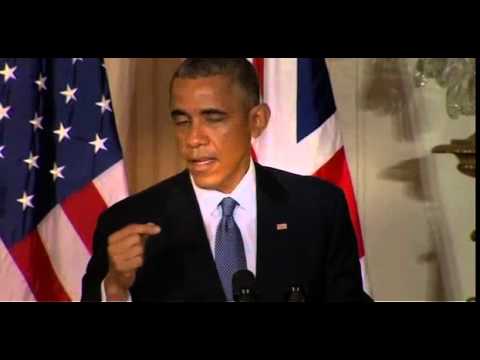LATEST: Iran Pulls Back From Engagement With Saudi Arabia, Blames Saudi Foreign Minister
While media focus on President Obama’s pointed message to the US Congress on Friday over nuclear talks with Iran, cautioning the legislators against any attempt to impose new sanctions, the bigger message may lie elsewhere in Obama’s statement.
The President said, at a press conference with British Prime Minister David Cameron, that the chances of a comprehensive settlement with Tehran are “less than 50/50”.
Talks resumed this week, with a meeting between Iranian Foreign Mohammad Javad Zarif and US Secretary of State John Kerry, three days of Iran-US bilateral discussions, and a plenary between Iran and the 5+1 (US, Britain, France, Germany, Russia, and China) on Sunday.
The discussions have already been extended twice, after failure to reach a comprehensive resolution last year, with interim arrangements maintained until July 1.
Obama said he would veto any additional economic measures while Iran and the 5+1 Powers were still negotiating. He declared that lawmakers would be responsible if sanctions collapsed the talks and warned that a diplomatic failure could even lead to a war which “Congress will have to own”:
It will jeopardize the possibility of providing a diplomatic solution to one of the most difficult and long-lasting national security problems we have faced in a very long time.
My main message to Congress at this point is, “Just hold your fire.”
However, the President assured the audience that if the current discussions do not advance, he would take tough action:
If Iran cannot provide us the kind of assurances that would [us]…to conclude that they are not obtaining a nuclear weapon, we are going to have to explore other options and I will be the first one to come to Congress and say, “We need to tighten the screws.”…
We leave all options on the table.
Republicans in the Senate have said they are seeking a sanctions vote by February and may also vote to restrict the Obama administration’s ability to confirm and implement the comprehensive nuclear agreement.
Iran Pulls Back From Engagement With Saudi Arabia, Blames Saudi Foreign Minister
In a sign that the Rouhani Government is pulling back from attempts to engage with Saudi Arabia, Deputy Foreign Minister Hossein Amir Abdollahian has blamed Saudi Foreign Minister Saud al-Faisal for tensions.
Amir Abdollahian said Prince Saud’s remarks criticizing Iran’s ally Syria dissuaded Iranian Foreign Minister Mohammad Javad Zarif from visiting Riyadh:
The meeting between the Iranian and Saudi foreign ministers in New York [at the UN] was positive. After the visit which bore constructive results for the regional states, we received a written invitation from the Saudi foreign minister for Iranian Foreign Minister Mohammad Javad Zarif to visit Riyadh to discuss the regional and international issues, and then a date for his visit was specified.
Unfortunately, the Saudi foreign minister’s harsh and unexpected remarks on Syria caused the visit to be cancelled.
Amir Abdollahian said Prince Saud is still seeking the meeting with Zarif, but the Iranian Foreign Minister will accept “once conditions are ripe”.
President Rouhani has sought better relations with Saudi Arabia since his election in 2013, with his ally, former President Hashemi Rafsanjani, establishing a channel for communication with King Abdullah. However, relations have been strained by the Syrian conflict, in which Saudi Arabia supports the insurgency against President Assad, and by the recent fall in global oil prices.
Over the last six weeks, Iran has blamed the Saudis for leading a “foreign plot” which has reduced the prices by about 60% since June, threatening Iran’s already-troubled economy.
Iran Admits No Gas Pipeline with Pakistan Before End of 2015
Iran has said that its long-delayed natural gas pipeline project with Pakistan will not be completed before the end of 2015.
Tehran cautioned Islamabad over falling behind the schedule in fulfilling its obligations in a multi-billion-dollar pipeline project that is to take natural gas from Iran to Pakistan.
“Under a contract signed between Iran and Pakistan, the latter had to deliver its commitments by starting import of Iran’s gas supplies in December 2014, but it seems unlikely for Pakistan to take any measures before the end of 2015,” Hamid Reza Araqi, the Managing Director of the National Iranian Gas Company, told a press conference in Tehran on Saturday.
Araqi denied reports that Iran has decided not to fine Islamabad for the long delay in completing the project. He said the terms for imposition of the fines are “still alive and enforceable”.
Iran and Pakistan signed an agreement in 2009 for the 1800-km (1100-mile) pipeline, with the first flow of gas to Pakistan by December 31, 2014. The project was inaugurated on the Iranian-Pakistani border, with the Presidents of both countries attending, in February 2013; however, Islamabad soon ran into financial difficulties over its part of the project.
Pakistan sent a team to Iran in February to say that it could not complete its 700-km (430-mile) section without a $2 billion loan from Tehran. The Islamic Republic has refused to provide the money.
Daily Newspaper Suspended for Publishing Actor Clooney’s Remarks on Charlie Hebdo Killings
The recently-launched daily newspaper Mardom-e Emrooz has been suspended after a Page 1 story and photograph of actor George Clooney’s remarks on last week’s mass killing at the Charlie Hebdo magazine in Paris:
The article titled “Clooney: #JeSuisCharlie” likely reason for banning #Iran‘s daily newspaper “Mardom-e-Emrooz”. pic.twitter.com/3RQmlKgSc1
— Abas Aslani (@abasinfo) January 17, 2015
Hardliners denounced the newspaper for publishing Clooney’s remarks, made at the Golden Globe awards, expressing solidarity with the victims. It featured the actor with a “Je Suis Charlie” badge on the lapel of his tuxedo.

